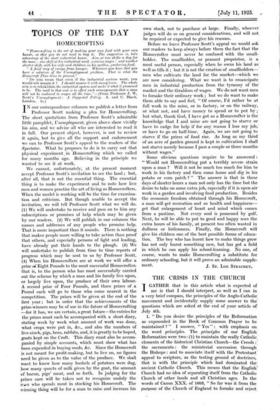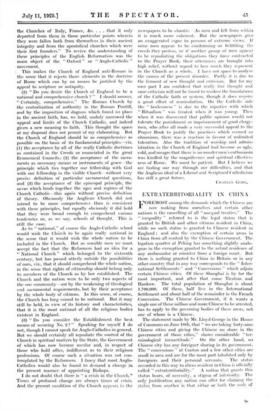THE CRISIS IN THE CHURCH
IGATHER that in this article what is expected of me is that I should interpret, as well as I can in a very brief compass, the principles of the Anglo-Catholic: movement and incidentally supply some answer to the' questions which are asked at the end of your article of! July 4th.
1. " Do you desire the principles of the Reformation as expounded in the Book of Common Prayer to be maintained ? " I answer, " Yes " : with emphasis on the word principles. The principles of our English' Reformation were two : (1) to maintain the really Catholic' elements of the historical Christian Church—the Creeds : the sacraments : the ministerial succession through the Bishops : and to associate itself with the Protestant' appeal to scripture, as the testing ground of doctrines, that is with the principle which had dominated the ancient Catholic Church. This means that the English' Church had no idea of separating itself from the Catholic Church of other lands and all Christian ages. In the words of Canon XXX. of 1603, " So far was it from the purpose of the Church of England to forsake and reject: the Churches of Italy, France, &c. . . . that it only departed from them in those particular points wherein they were fallen both from themselves in their ancient integrity and from the apostolical churches which were their first founders." To revive the understanding of these principles of the English Reformation was the main object of the " Oxford " or " Anglo-Catholic " movement.
This makes the Church of England anti-Roman in the sense that it rejects those elements in the doctrine of Rome which can by no means be justified by the appeal to scripture or antiquity. .
(2) " Do you desire the Church of England to be a national and comprehensive church ? " I should answer, "- Certainly, comprehensive." The Roman Church by the centralization of authority in the Roman Pontiff, and by the imposition of dogmas which found no place in the ancient faith, has, we hold, unduly narrowed the appeal and limits of the Church Catholic, and indeed given a new meaning to faith. This thought the space at my disposal does not permit of my elaborating. But the Church of England should be as comprehensive as possible on the basis of its fundamental principles—viz.
(1) the acceptance by all of the really Catholic doctrines as contained in the Creeds or enunciated in the great Ecumenical Councils ; (2) the acceptance of the sacra- ments as necessary means or instruments of grace—the principle which ties together our fellowship with God with our fellowship in the visible Church—without very precise definition of particular sacramental questions, and (3) the acceptance of the episcopal principle, the nexus which binds together the ages and regions of the Church Catholic—this again without precise definition of theory. Obviously the Anglican Church did not intend to . be more comprehensive than is consistent with these principles, but equally obviously it did hold that they were broad enough to comprehend various tendencies or, as we say, schools of thought. This is still the case.
As to " national," of _course the Anglo-Catholic school would wish the Chiirch to be again really national in the sense that it would wish the whole nation to be included in the Church. But as sensible men we must accept the fact that the Reformers had an idea for a " National Church " which belonged to the sixteenth century, but has passed utterly outside the possibilities of ours, viz., that it should comprehend the whole nation,.
in the sense that rights of citizenship should. belong only to members of the Church as by law established. The Church and the nation were to be only two aspects of the one community—not by the weakening of theological and sacramental requirements, but by their acceptance by the whole body of citizens. In this sense, of course, the Church has long ceased to be national. But it may still be held, in view of its history and characteristics, that it is the most national of all the religious bodies existent in England.
(3) " Do you consider the Establishment the best means of securing No. 2 ? " Speaking for myself I do not, though I cannot speak for Anglo-Catholics in general. But we should certainly all repudiate the control of the Church in spiritual matters by the State, the Government of which has now become secular and, in respect of those who hold office, indifferent as to their religious professions. Of course such a situation was not con- templated by the Reformers. I fancy that most Anglo- Catholics would also be found to demand a change in the present manner of appointing Bishops.
I do not doubt that there is " a crisis in the Church." Times of profound change are always times of crisis. And the present condition of the Church appears in the newspapers to be chaotic. As seen and felt from within it is much more coherent. But the newspapers give an exaggerated vogue to persons of extreme views. If some men appear to be condemning or belittling the creeds they profess, or if another group of men appear to be repudiating the obligations they have contracted to the Prayer Book, their utterances are brought into high relief, without regard to how much they represent in the Church as a whole. I have not space to analyse the causes of the present disorder. Partly it is due to the ferment of new thought and criticism. But for my own part I am confident that really free thought and sane criticism will not be found to weaken the foundations of the Catholic faith or system, though it does require a great effort of reorientation. On the Catholic side the " lawlessness " is due to the injustice with which " Ritualism " was treated when it was young. Then when it was discovered that public opinion would not tolerate the punishment or imprisonment of good clergy- men, who after all made a very successful appeal to the Prayer Book to justify the practices which seemed, so obnoxious, there was a reaction in favour of unlimited toleration. Also the tradition of worship and admin- istration in the Church of England had become so ugly, cold, and meagre that there is no wonder men's enthusiasm was kindled by the magnificence and spiritual effective- ness of Rome. We must be patient. But I believe we are finding our way through our difficulties, and that the Anglican ideal of a Liberal and Scriptural Catholicism has still a great future.
Cit.t R LES GORE.



























































 Previous page
Previous page